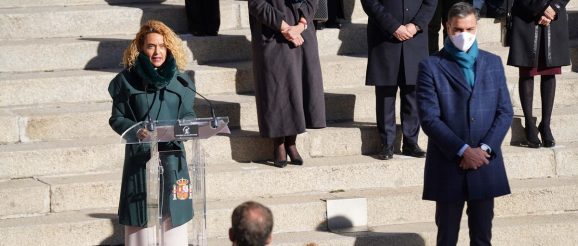43 years of Spanish Constitution: decentralization was its great innovation. Singular regulations for Catalonia.

Eulalia Vintró, Professor at the University of Barcelona
December 9, 2021
Celebration of the 43rd anniversary of the Constitution, in the image Pedro Sanchez and Meritxell Batet. / DAVID CASTRO
A quick glance at these past years and the alternation between governments of the right and the left clearly illustrate the effectiveness of the constitutional text and the possibility of interpreting it in very different ways.
December 6 marked 43 years since the approval of the Spanish Constitution that put an end to the Franco regime and its dictatorship. Obviously, the referendum held throughout Spain enjoyed wide participation everywhere, except in the Basque Country, where less than half of the population voted. Catalonia exceeded sixty percent of voters and valued the new legal framework very positively. The Constitution, drawn up by consensus among the various parliamentary forces, did not respond to the specific aspirations of any party but to the respective concessions, in order to reach a common goal. In addition, and taking into account the Spanish constitutional history of the 19th century, all the speakers made an effort to draft a text that would admit different interpretations, more to the right or more to the left, depending on the parliamentary majorities that were produced in each election.
For the vast majority of Catalans, the Magna Carta of 1978 was a great reason for satisfaction and expectations, not only in the general sphere of rights and freedoms but, and especially, because of the great innovation that decentralization and the new State of the autonomies entailed. The way was thus opened to the elaboration of a Statute of Autonomy that should establish the singular regulations of Catalonia. Nor can we forget that among the seven constitutional speakers there were two Catalans, Miquel Roca Junyent and Jordi Solé Tura, the first from Convergència and the second from the PSUC, one from the right and one from the left. Both played a great role in the constitutional presentation and in the process of explanation and dissemination of the contents of the new norm, in such a way that they increased the positive assessment of the new legal framework that had just been opened.
A quick glance at these past 40 years and the alternation between governments of the right and the left, with or without absolute majorities, clearly illustrate the effectiveness of the constitutional text and the possibility of interpreting it in very different and even opposite ways. Likewise, it has made possible the drafting of the autonomy statutes of each Autonomous Community and its revision with a new wording. No modification has been made to the Magna Carta except for the adaptation to European regulations, which enjoyed a single reading and the unanimous approval of the Cortes Generales.
Today, however, the situation has changed and for some time now, various political forces have expressed the need to introduce modifications in the 1978 text on issues such as the environment, feminism, the structure of the State, some rights and freedoms, as well as, by previously holding a referendum, the replacement of the monarchy by the republic. Given that the constitutional reform requires a majority of three-quarters and that there is no possible agreement between the parliamentary forces with the most seats, some of which are not even discussed, this reform does not seem viable at the moment.
In Catalonia, the situation offers another perspective that even more involves the tangle: the dynamics of the ‘procés’ and the claim for independence make any type of constitutional reform impossible. On the same day 6, the ‘president’ of the Generalitat declared: “Catalonia has nothing to celebrate.” “The Government does not want any reform of the Spanish Constitution, what it wants is a Catalan Constitution and successfully complete the independence process”, declarations where he also affirms that it is obsolete, because it does not represent the interests of the Catalan citizenry and is incompatible with the will of the Catalan people for the future. Thanks to the Spanish Constitution, there is Catalan autonomy, its Statute and its institutions, but the ‘president’ of the Generalitat, representative of the State in Catalonia, wants to ignore the rule that legitimizes his position, considers it obsolete and refuses to reform it. At the same time, however, he dialogues and negotiates with the State Government, he will help to approve the General Budgets, having achieved the negotiation of its own and the foreseeable approval, and he will maintain the intergovernmental dialogue table, in order to find a way out of the Catalan secessionist conflict. It is also necessary for him to dedicate a lot of effort to regain harmony among the members of the Catalan Government and to exercise his government program, currently very paralyzed. It takes action and not confrontation.
The post 43 years of Spanish Constitution: decentralization was its great innovation. Singular regulations for Catalonia. appeared first on OpenKat.eu.
